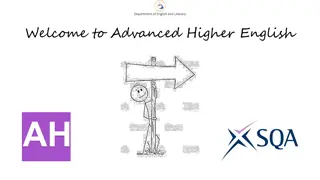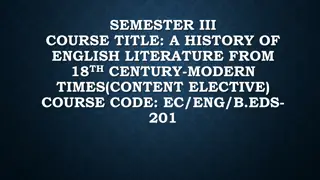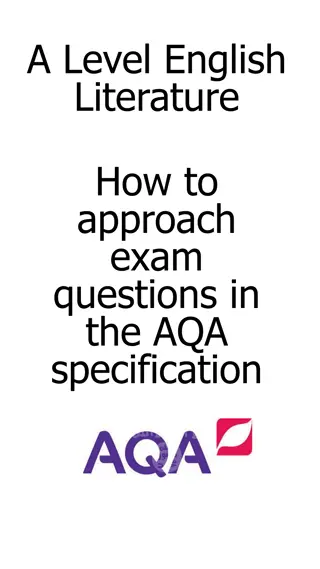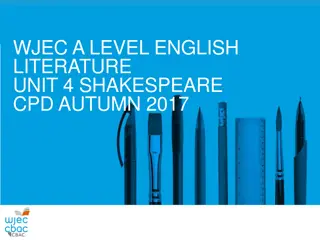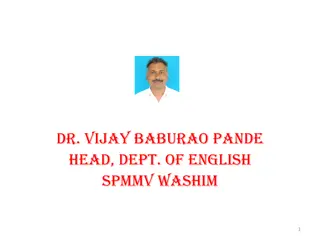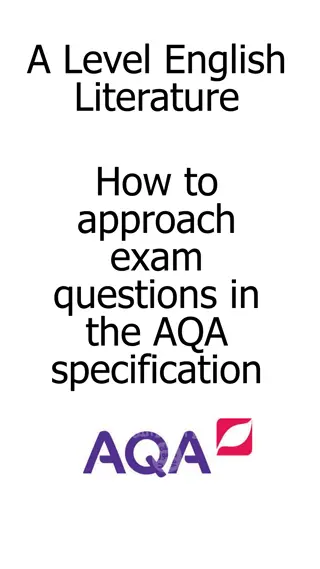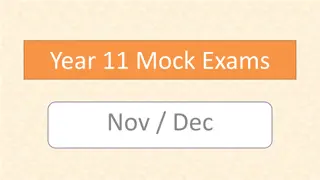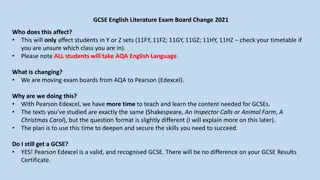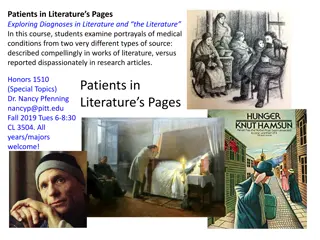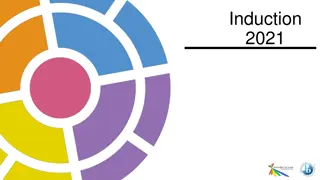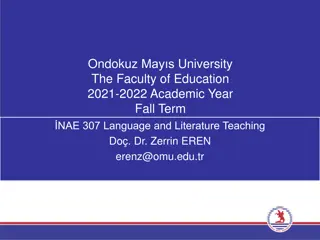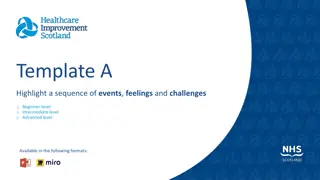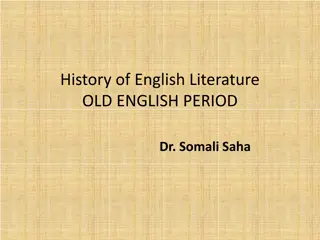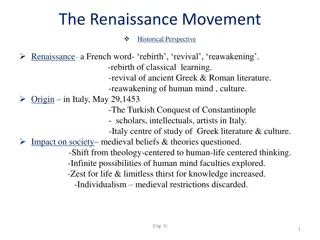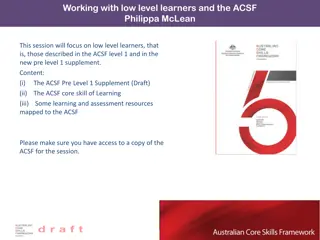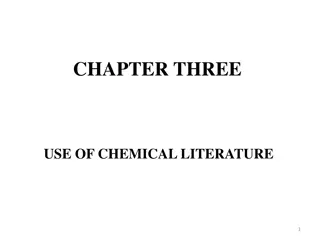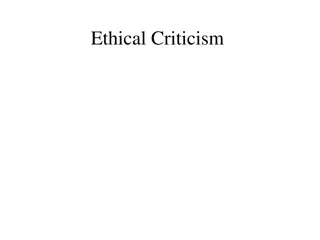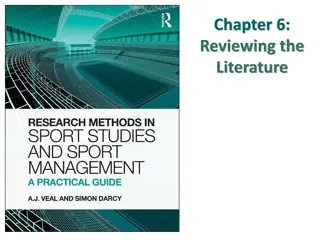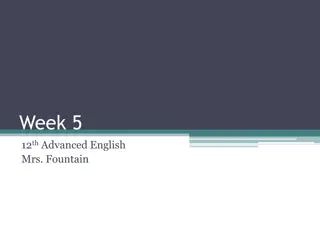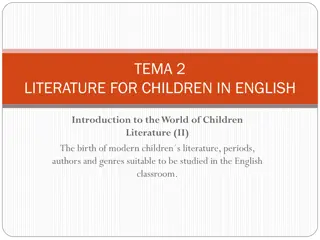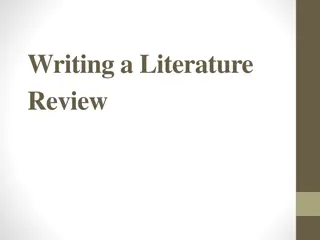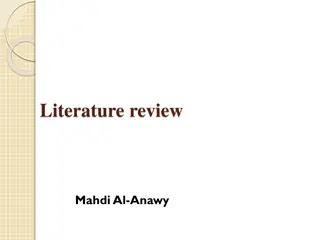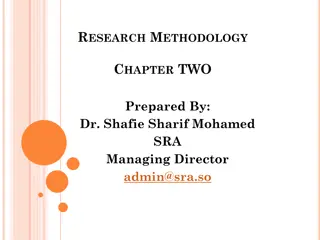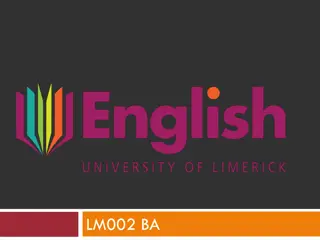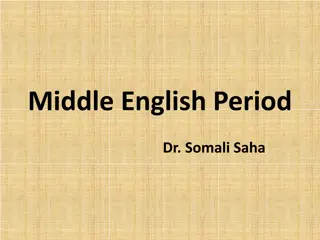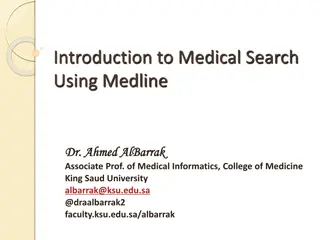Evolution of English Literature: From Old English to Beowulf
The English language, evolving over 1,400 years, transitioned from Old English to Middle English with works like Beowulf standing as a pinnacle of Old English literature. The epic poem tells the tale of Beowulf's heroic feats in pagan Scandinavia, showcasing elements of alliteration, a key literary
0 views • 46 slides
Advanced Higher English: Transition and Expectations
Moving from Higher to Advanced Higher English requires a deeper level of literary knowledge and independent critical reading and writing skills. The Advanced Higher English course involves creating a portfolio with creative and discursive writing pieces, as well as a dissertation focusing on literat
0 views • 6 slides
Advanced Clinical Practice Framework and Pillars of Practice
The document discusses the advanced clinical practice framework and the four pillars of practice which include leadership & management, clinical practice, education, and research. It emphasizes the importance of core capabilities and area-specific competence in advanced clinical practice. The role o
2 views • 8 slides
Effective Strategies for Literature Searches and Re-Use of Scholarly Literature
Conducting literature searches involves surveying existing publications and information on a specific topic. Different search strategies, from simple searches to systematic queries and snowballing, are utilized based on research needs. Learning objectives include building search strategies, using ad
3 views • 19 slides
Introduction to Isixhosa Language and Literature - Exploring Characters and Themes
This content provides an overview of Isixhosa as a first additional language (FAL) and delves into key aspects of literature such as character development and themes. It discusses the importance of characters in storytelling, emphasizing the significance of round and flat characters. The article als
3 views • 28 slides
Exploring English Literature from the 18th Century to Modern Times
This course focuses on major literary movements from the 18th century to modern times, examining the history of modern literature and exploring overlapping trends and traditions. Students will critically analyze historical texts, write organized critical essays, understand word structures, and grasp
1 views • 9 slides
Approach to Exam Questions in AQA A-Level English Literature
Learn how to effectively approach exam questions in AQA A-Level English Literature focusing on the types of questions, especially in Paper 1 (Aspects of Tragedy) and Paper 2 (Social and Political Protest Writing). Understand the significance of Shakespearean extracts, explore tragic trajectories, an
0 views • 28 slides
Understanding Shakespeare's Extracts for WJEC A-Level English Literature Unit
Explore strategies for analyzing Shakespearean extracts effectively in the WJEC A-Level English Literature Unit, focusing on key points, detailed support, verbatim recall of critical views, and interpreting context. Learn how to prepare and respond to the Shakespeare extract questions, emphasizing c
0 views • 19 slides
Exploring English Literature through B. Prasad's Perspective
Delve into the study of English literature through the insightful division laid out by B. Prasad, covering poetry, drama, and prose. Gain a deep understanding of subjective and objective poetry, various poetical types, stanza forms, and different schools and movements in literature.
0 views • 14 slides
Approaching Exam Questions in A Level English Literature: AQA Specification Overview
Explore how to approach exam questions in A Level English Literature following the AQA specification, focusing on question types such as Aspects of Tragedy and Social and Political Protest Writing. The guidance includes insights on interpreting Shakespeare extracts, understanding tragic trajectory,
0 views • 28 slides
Importance of Teaching English at Different Education Levels
English language holds a significant position in the educational system and national life of India. This presentation by Dr. A. Mary Delphine highlights the aims and objectives of teaching English, emphasizing its importance in India and the modern world. The objectives include understanding the rat
1 views • 32 slides
Comprehensive Literature Review Guidelines for Your Dissertation
Discover expert guidelines for conducting a thorough literature review in your dissertation. Explore topics such as literature search strategies, theoretical frameworks, review of the literature, synthesis, and analysis, with actionable tips provided throughout.
0 views • 11 slides
Exploring the Significance of Persian Language and Literature in Indian History
Persian language and literature hold a crucial place in Indian history, serving as a prime source for understanding the medieval period. Scholars in India have dedicated their lives to preserving and promoting Persian history, language, and literature. The rich cultural heritage of India, dating bac
0 views • 9 slides
Tips for Year 11 English Literature Mock Exams
In preparation for the Year 11 mock exams in English Literature, understand the key themes and characters of "Romeo and Juliet" and "A Christmas Carol". Learn about the structure of the papers and the essential knowledge required for success. Explore the exam format, sections, and time allocations f
0 views • 18 slides
Mastering the Literature Review Process
Understanding the significance of literature review, this guide emphasizes the essential steps involved in conducting a successful literature review - from planning and research problem identification to critical analysis and contribution to existing literature. It explains the importance of develop
0 views • 16 slides
GCSE English Literature Exam Overview
This GCSE English Literature exam overview provides details on the components, assessment objectives, text choices, and key information for students. It covers Shakespeare, Poetry, Post-1914 Prose/Drama, 19th Century Prose, and Unseen Poetry. Students will engage with a variety of texts ranging from
5 views • 23 slides
Effective Strategies for Conducting Business Research Literature Review
This literature review provides insights into conducting business research effectively, covering topics such as how to search, read, and write literature reviews, along with the goals and types of literature. It emphasizes the importance of generating research ideas, demonstrating knowledge, and int
1 views • 13 slides
Changes in GCSE English Literature Exam Board - Important Information for Students
Significant updates have been made to the GCSE English Literature exam board for 2021, affecting students in specific sets. The transition from AQA to Pearson (Edexcel) aims to provide more teaching and learning time for essential content, while maintaining the same literature texts studied. The que
0 views • 7 slides
Exploring Diagnoses in Literature and the Literature
This course delves into portrayals of medical conditions in literature versus research articles. It explores the intersection of science and literature, analyzing works like "Black Swan Green" and "The Reason I Jump" to understand how they depict conditions like stuttering and autism. Through studen
1 views • 28 slides
Evolving Perspectives on Literature and Translation
Explore the intertwined relationship between national literature, comparative literature, and world literature, delving into the evolution of translation studies. Reflect on the shift from national literary histories to world histories of literature, highlighting the significance of world literature
3 views • 54 slides
English Literature Course Overview and Assessment
English Literature course covers love through the ages, Shakespeare, WW1 literature, and independent critical study. The assessment includes exams and coursework to develop written, communication, and analytical skills. Supporting activities include theatre trips, research projects, and revision cla
0 views • 16 slides
English Literature Course: Analysis of Novels and Short Stories
Explore the world of English literature through an in-depth study of novels and short stories in this course outline for the 2021-2022 academic year at Ondokuz Mayıs University. Delve into the development of the novel in England, from the 18th century to modernism, and analyze key works by renowned
0 views • 4 slides
Template A: Highlighting Events, Feelings, and Challenges at Various Levels
This template, available in beginner, intermediate, and advanced levels, helps in showcasing a sequence of events, feelings, and challenges. It includes specific timelines, moments, touchpoints, and highlighted experiences at each level. The advanced level example demonstrates a challenging journey
0 views • 6 slides
Overview of Anglo-Saxon Literature in Old English Period
The Old English period in English literature, dominated by the Anglo-Saxons, showcased a rich tapestry of poetic works, notable authors, and distinct dialects. Key literary features include pagan and Christian elements, as seen in epic poems like Beowulf and Caedmonian Poems. Additionally, the perio
0 views • 11 slides
The Renaissance Movement: Historical Perspective and Impact on English Literature
The Renaissance, meaning "rebirth," was a period of revival in classical learning, centered in Italy after the Turkish Conquest of Constantinople in 1453. This era saw a shift from medieval beliefs to human-centered thinking, with a focus on exploring the limitless possibilities of the human mind an
0 views • 9 slides
Supporting Low-Level Learners with ACSF: A Focus on Pre-Level 1 Skills
This session delves into assisting low-level learners based on the ACSF level 1 and pre-level 1 supplement. It covers the ACSF Pre-Level 1 Supplement, core learning skills, and resources aligned with the ACSF. Learners at this level show readiness for learning but may need varying levels of support
0 views • 20 slides
Understanding the Importance of Chemical Literature in Research
Reviewing chemical literature is essential in the research process to identify existing knowledge, develop hypotheses, plan methodologies, and discover unanswered questions. The vast and complex nature of chemical literature poses challenges in finding relevant information, especially with evolving
0 views • 22 slides
Exploring Ethical Criticism and Literature's Human Possibilities
Ethical criticism in literary studies revolves around the intersection of ethics, literature, and criticism. It tackles concerns about the relationship between value judgments, ethics, and aesthetics, emphasizing the importance of reconnecting criticism with moral principles. Literature offers a dee
0 views • 21 slides
Understanding the Importance of Literature Review in Research
Exploring the roles of literature in research, this content emphasizes the significance of reviewing existing literature to gather ideas, compare methodologies, and integrate supportive information. It also highlights the types of reviews and essential questions to consider during the literature rev
0 views • 12 slides
The Status of Literature in Secondary Schools of the O.E.C.S. - Research Findings by Dr. Anthony Felicien
Research by Dr. Anthony Felicien examines the status of literature in secondary schools of the O.E.C.S., focusing on the decline of interest in literature among students, influenced by historical curriculum changes and parental attitudes. The study highlights the importance of studying literature fo
0 views • 35 slides
Advanced English Lesson Plans for Week 5 with Mrs. Fountain
Explore parts of speech, sentence structures, and punctuation in this week's advanced English lessons with Mrs. Fountain. Dive deep into Lewis Carroll's poem "Jabberwocky" while learning about clauses, sentence types, capitalization, and more. Each day presents a new aspect of English language and l
0 views • 9 slides
Evolution of Children's Literature in English: From Alice to Modern Times
Explore the birth of modern children's literature starting with the publication of "Alice's Adventures in Wonderland" in 1865 by Charles Dodgson (Lewis Carrol), marking a shift towards entertaining and engaging literature specifically for children. Prior to this, children mainly read folklore and ad
0 views • 35 slides
Mastering the Art of Writing Literature Reviews
Understanding the essence of a literature review, its descriptive and analytical components, selecting key articles, and finding relevant sources are essential steps in crafting a comprehensive literature review. By integrating ideas from various sources and highlighting crucial findings, a literatu
0 views • 18 slides
Comprehensive Guide to Literature Review Process
A literature review is essential before conducting research to identify existing information, gaps in literature, major works, and relationships between studies and theories. Follow steps such as defining the topic, sourcing information, discussing findings, and drafting to write an effective litera
0 views • 8 slides
Effective Strategies for Conducting a Literature Review in Research Methodology
Understanding the importance of literature review in research methodology, this chapter discusses the objectives, aims, and guidelines for writing a comprehensive literature review. It emphasizes the significance of identifying gaps in existing knowledge, structuring the review, and organizing infor
0 views • 33 slides
GCSE English Language and Literature Overview
GCSE English Language and Literature subjects are led by Mrs. A. Baker and Mr. Doodson. English Language is examined by OCR, while English Literature is examined by Edexcel. Both subjects have two examination papers worth 100% of the grade. English Language papers focus on reading and writing skills
0 views • 14 slides
Study English Programme at UL: Literature, Analysis, and Context
The English program at UL fosters critical and analytical skills through literature appreciation and exploration of social, cultural, and historical contexts. Students delve into literary analysis from the 16th century to modern times, with elective choices for personal interests. The curriculum cov
0 views • 5 slides
Choosing the Right English Course for Your HSC: Advanced, Standard, or Studies?
When preparing for the HSC, selecting the appropriate English course is crucial as it is compulsory. Options include Advanced English, Standard English, and English Studies, each offering unique benefits. Advanced English challenges students with higher-order thinking skills, while Standard English
0 views • 25 slides
Influence of the Norman Conquest on Middle English Literature
The Norman Conquest greatly impacted Middle English literature, shaping its nature and character. This influence brought about contact with European literature, a shift away from heroic themes, incorporation of sunny nature aspects, use of rhymed verse forms, existence of various literary dialects,
0 views • 6 slides
Effective Medical Literature Search Techniques by Dr. Ahmed AlBarrak
Dr. Ahmed AlBarrak, an Associate Prof. of Medical Informatics at King Saud University, provides valuable insights on medical literature search using resources like Medline. The content covers objectives of literature search, methods to find relevant literature, advantages of electronic journals, and
0 views • 39 slides

